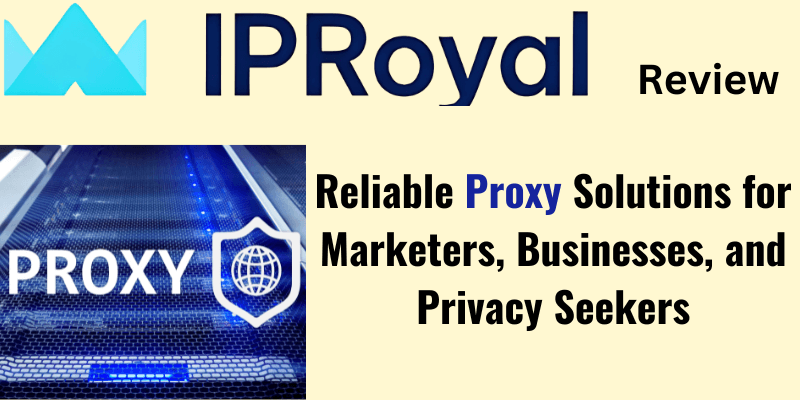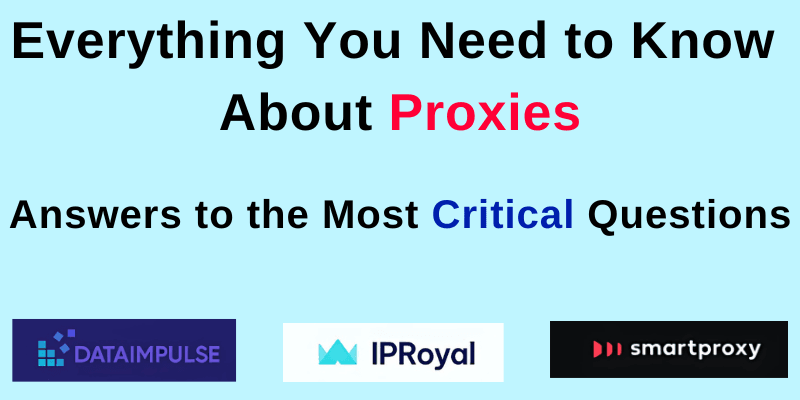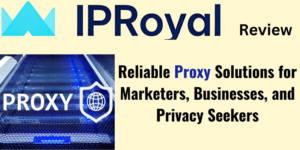In today’s world, where privacy, security, and access to global content are increasingly vital, proxies have become a hot topic. Whether you’re trying to protect your online identity or access region-restricted content, proxies are one of the tools people turn to. But there are plenty of questions surrounding them. In this blog post, we’ll answer the most common questions people have about proxies and their usage.
Table of Contents
1. What is a Proxy and How Does it Work?
A proxy is essentially an intermediary server between your device and the internet. When you use a proxy, your requests to visit a website or access content go through this server. The proxy then sends the request on your behalf, and the website responds to the proxy, which forwards it back to you. This helps hide your real IP address, giving you a layer of anonymity.

2. Are Proxies Legal to Use?
In most cases, proxies are completely legal. However, the legality depends on how and where they are used. Some countries, particularly those with strict internet regulations like China or Russia, may have laws restricting or monitoring proxy usage. It’s important to be aware of local laws, especially if you are using proxies to bypass government censorship.
3. What’s the Difference Between a Proxy and a VPN?
While both proxies and VPNs can hide your IP address, they operate differently. Proxies reroute your internet traffic without encrypting it, whereas VPNs both reroute and encrypt your data. VPNs provide higher levels of privacy and security, making them better suited for tasks like secure browsing and data protection. Proxies, on the other hand, are often faster and useful for less sensitive tasks, like bypassing geo-restrictions.

4. Are Free Proxies Safe to Use?
Free proxies come with significant risks. Many free services may not provide adequate security, meaning your data can be exposed or even intercepted. Some free proxies are known to inject ads, track your browsing behavior, or even be used as bait for malicious actors to harvest sensitive data. If privacy and security are priorities, it’s better to use a reputable paid proxy service.
5. What Types of Proxies Are Available?
There are several types of proxies, each with specific uses:
- HTTP Proxies: Used for web browsing, they work well for accessing websites but only handle HTTP traffic.
- HTTPS Proxies: These are secure versions of HTTP proxies and are used for encrypted data transmission.
- SOCKS Proxies: These can handle any type of traffic (HTTP, FTP, etc.), making them versatile for tasks like torrenting or online gaming.
- Residential Proxies: These are IP addresses provided by real ISPs. They appear as regular users, making them harder to detect and block.
The right choice depends on your needs—SOCKS proxies, for example, are better for gaming, while residential proxies are best for scraping or avoiding detection.
6. Can Proxies Help Access Geo-Blocked Content?
Yes, proxies are commonly used to bypass geo-restrictions. For example, if you want to access a streaming service like Netflix or Hulu that’s only available in specific regions, you can use a proxy with an IP address from that region. However, keep in mind that some platforms actively block proxy traffic, so you’ll need a high-quality proxy service to reliably access this content.
7. Do Proxies Protect My Privacy and Anonymity?
Proxies offer a basic level of anonymity by hiding your real IP address, but they don’t provide complete privacy. Since proxies don’t encrypt your data, your internet service provider (ISP) or a determined attacker could still monitor your activity. For better privacy, VPNs or proxies combined with encryption are more effective.
8. Can Proxies Improve Internet Speed or Reduce Lag?
In some cases, proxies can reduce lag and improve speed, especially for tasks like streaming or gaming. This happens when proxies allow you to bypass congestion by connecting to faster servers closer to the destination website. However, proxies can also slow down your connection, especially if the proxy server is overloaded or located far from your region. Paid, premium proxies are generally faster and more reliable than free ones.
9. What Are the Risks of Using Proxies?
The primary risks of using proxies are:
- Data Interception: Free or unreliable proxies can expose your data to malicious actors.
- Malware: Some proxies inject malware into your connection or show unwanted ads.
- Tracking: Many free proxies track your online activities, potentially selling this data to advertisers.
- Blocking: Websites may detect and block traffic from proxy servers, particularly with free or poorly managed services.
Choosing a reputable proxy service mitigates these risks.
10. Can Proxies Be Used for Web Scraping?
Yes, proxies are often used for web scraping. Proxies allow users to gather data from websites without being blocked or flagged by anti-scraping systems. Residential proxies are particularly effective because they appear as real users. However, the legality of web scraping varies by jurisdiction and website, so it’s important to review terms of service and applicable laws before scraping data.

11. Do Websites Detect and Block Proxies?
Some websites can detect and block proxies, especially free or overused proxies. Techniques like IP blacklisting, rate-limiting, and CAPTCHA challenges are used to prevent proxy usage. To avoid detection, users often turn to residential proxies or rotating proxies, which change the IP address frequently and make it harder for websites to detect them.
12. Can I Use a Proxy on My Mobile Device?
Yes, proxies can be set up on mobile devices, whether Android or iOS. You can manually configure proxy settings in your device’s network settings or use a proxy app provided by your proxy service. This allows you to browse anonymously, bypass geo-restrictions, and even save on mobile data by routing through a proxy.
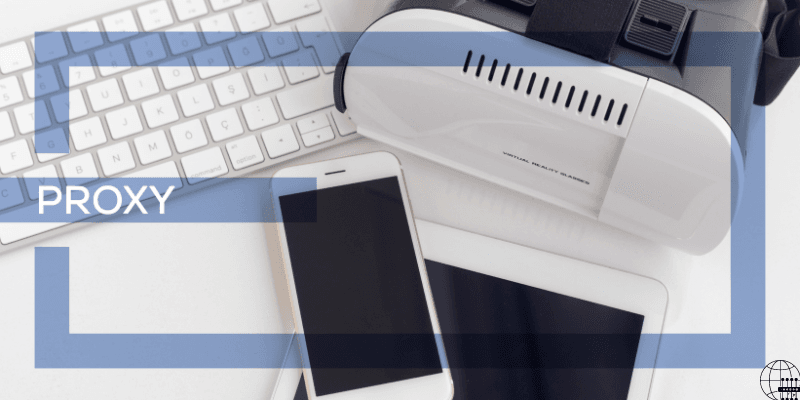
13. How Does a Proxy Affect Online Security?
Proxies offer minimal security benefits on their own. Since they don’t encrypt traffic, they don’t protect against hackers, snooping, or data theft. For stronger online security, proxies should be used alongside encryption methods, such as HTTPS or a VPN, to ensure your data is safe from malicious actors.
14. How Do I Set Up and Use a Proxy?
Setting up a proxy varies depending on your device and operating system. Here’s a basic overview for different platforms:
- Windows: Go to network settings, find the proxy section, and input the proxy server details.
- Mac: Navigate to network preferences, select your connection, and configure proxy settings.
- Android: Go to Wi-Fi settings, select the network, and enter the proxy information.
- iOS: Under Wi-Fi settings, select your network, and scroll down to configure the proxy manually or automatically.
Proxy services often provide step-by-step guides for specific configurations.
15. Can I Use Proxies for Torrenting or P2P Sharing?
Yes, proxies can be used for torrenting or peer-to-peer (P2P) sharing, but it’s important to choose the right type of proxy. SOCKS5 proxies are commonly recommended for these activities due to their ability to handle different types of traffic. However, a VPN may be a better option because it encrypts your connection, providing both privacy and security.
Conclusion: A Look at 3 Popular Proxies
Proxies are powerful tools that can enhance your online experience, improve privacy, and give you access to content that would otherwise be restricted. However, not all proxies are created equal, and choosing the right one depends on your needs. To help you make an informed decision, let’s take a look at three popular proxy services: IPRoyal, DataImpulse, and Smartproxy. Each has its unique features and strengths.
1. IPRoyal
IPRoyal offers a wide range of proxy services, including residential proxies, data center proxies, and mobile proxies. Its standout feature is its ethical approach, as the company rents IPs from users who voluntarily share their internet connection, ensuring high-quality, undetectable residential proxies.
- Key Features:
- Residential proxies with IP addresses from real users.
- Rotating proxies for improved anonymity.
- Supports web scraping, SEO monitoring, and social media management.
- Highly compatible with automation tools.
IPRoyal is ideal for users who need reliable residential proxies for bypassing geo-blocks and performing web scraping tasks without getting flagged.
IPRoyal’s proxies are priced based on usage, making it a scalable option for both small and large projects. The cost is calculated per gigabyte, ensuring you only pay for what you use. This flexible model allows you to start small and increase your usage as needed. (From $1.75/GB)
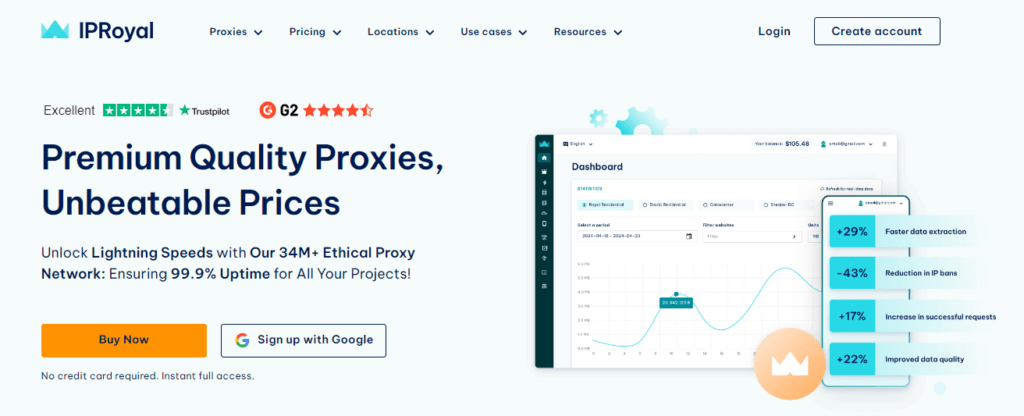
2. DataImpulse
DataImpulse is known for offering affordable and high-speed data center proxies, making it a popular choice for users looking for a budget-friendly solution. Its proxy services are best suited for less demanding tasks, such as accessing content quickly and anonymously.
- Key Features:
- Fast, high-performance data center proxies.
- Affordable pricing for large-scale operations.
- Supports multiple use cases like market research, social media automation, and content streaming.
DataImpulse is perfect for users who require speed and cost-efficiency rather than complete anonymity, as data center proxies are more likely to be detected than residential proxies. Rather than locking users into monthly subscriptions, the platform operates on a pay-as-you-go model, starting at just $0.45 per GB. This makes it especially appealing for smaller projects or businesses that want to control their expenses.
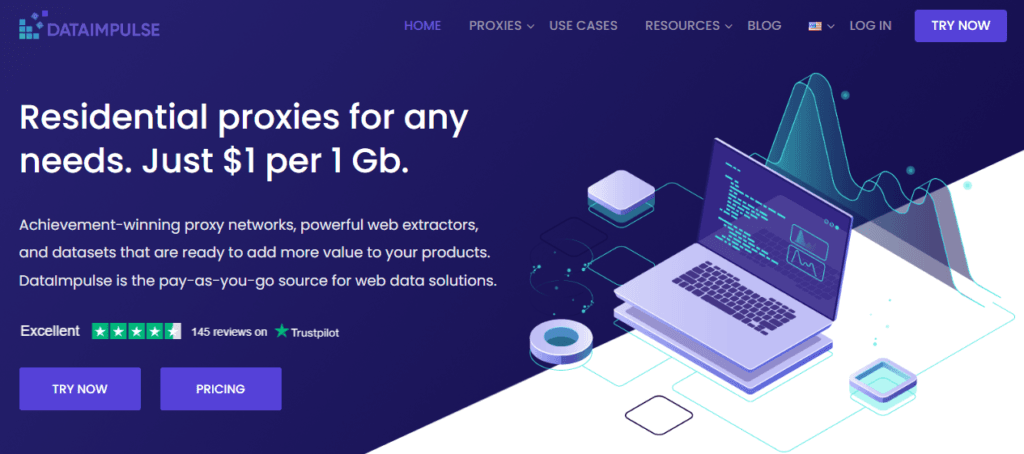
3. Smartproxy
Smartproxy is a versatile and premium proxy provider, offering residential, data center, and mobile proxies. It’s designed for users who need high-quality proxies for a wide range of tasks, from web scraping to online retail monitoring. Smartproxy’s rotating proxy pool helps users avoid detection by constantly changing IPs, making it excellent for handling large-scale requests.
- Key Features:
- Residential proxies with millions of IPs available worldwide.
- Highly effective for web scraping, sneaker bots, and e-commerce tasks.
- Automatic IP rotation to prevent bans and blockages.
- Easy integration with numerous third-party tools.
Smartproxy is the go-to choice for users who need reliable, undetectable residential proxies for intensive tasks like automation and scraping, with a focus on privacy and performance.
SmartProxy offers flexible pricing plans designed to suit different needs, whether you’re an individual user or a business. The platform provides a variety of subscription options based on usage, making it easier for customers to choose a plan that fits their budget and proxy requirements.
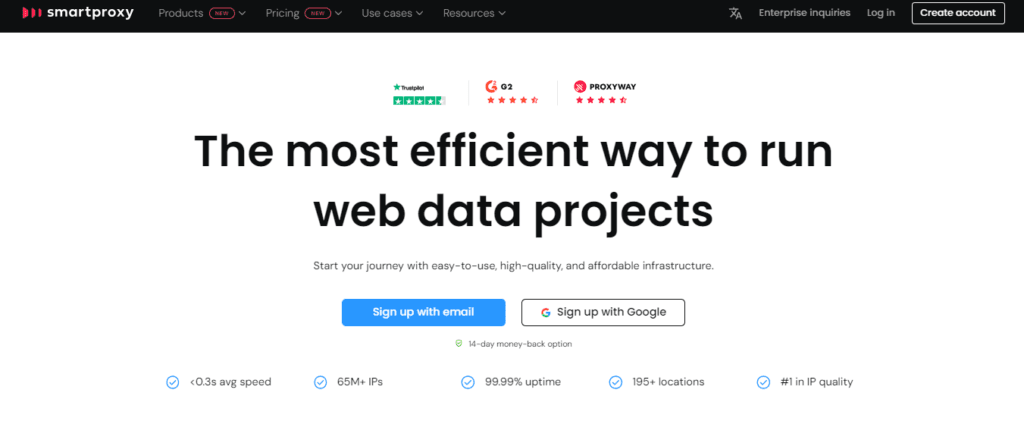
Key Differences of the Above 3 Proxies
- IPRoyal focuses on ethical residential proxies, making it a great choice for users prioritizing both privacy and responsible internet usage.
- DataImpulse excels in speed and affordability, making it ideal for users who need cost-effective, fast proxies for basic tasks.
- Smartproxy offers the most versatile proxy options, including residential and mobile proxies, making it the best option for users needing premium proxies for demanding tasks like web scraping and automation.
By selecting the right proxy service—whether it’s IPRoyal for privacy, DataImpulse for speed, or Smartproxy for versatility—you can enhance your internet experience while protecting your privacy and accessing restricted content with ease.
Explore comprehensive review, features and pricing guide for these three proxy services below:
